Classics and the Western Canon discussion
Divine Comedy, Dante
>
Paradiso 4: Three Questions
date newest »
newest »
 newest »
newest »
 And the three questions are? (I haven't read Canto 4 yet.) Incidentally, this is Shrove Tuesday -- so it is head out for pancakes and ice cream sundaes, with Lent starting tomorrow.
And the three questions are? (I haven't read Canto 4 yet.) Incidentally, this is Shrove Tuesday -- so it is head out for pancakes and ice cream sundaes, with Lent starting tomorrow.Here is Dali:
http://www.lockportstreetgallery.com/...
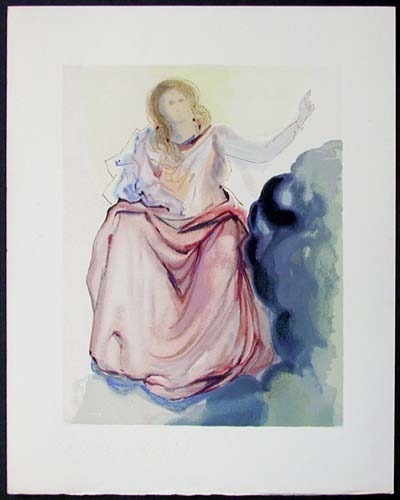
Salvador Dali: Paradiso Canto 4. “Beatrice Resolves Dante’s Doubts.”
As Beatrice wags her finger, "Now, see here, Dante, it's like this..." (Sorry, I'm in an irreverent mood this afternoon.)
 http://www.worldofdante.org/media/ima...
http://www.worldofdante.org/media/ima...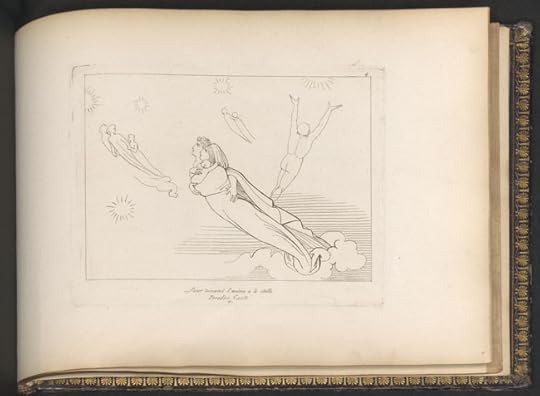
John Flaxman: Paradiso Canto IV.22. “Souls Appear to Return to Stars According to Plato’s Teaching.” 1793. Engraving.
We are back revisiting our friend Plato.
Canto 4.10-63 (Hollander)(view spoiler)
 Okay, who is "Timaeus"? (Line 49.) Okay, answer my own question, not "who" but "what" (one of Plato's dialogues).
Okay, who is "Timaeus"? (Line 49.) Okay, answer my own question, not "who" but "what" (one of Plato's dialogues). http://en.wikipedia.org/wiki/Timaeus_...
I find no Doré and no Blake for Canto IV.
 For Paradiso Canto IV images from the Bodleian Library 14th century manuscript try these:
For Paradiso Canto IV images from the Bodleian Library 14th century manuscript try these:http://www.bodley.ox.ac.uk/dept/scwms...
Paradiso, Canto IV. "Dante and Beatrice Conversing."
http://www.bodley.ox.ac.uk/dept/scwms...
Paradiso, Canto IV. "Beatrice and Dante Conversing."
 Lily wrote: "And the three questions are? (I haven't read Canto 4 yet.)"
Lily wrote: "And the three questions are? (I haven't read Canto 4 yet.)"1. If we're forced to not fulfill our vow, why is the degree of our reward less?
2. Do our (saved) souls return to our birth star?
3. Can we mend our broken vows by doing good works?
Beatrice answers the second question first, 4.1-63, and then the first question, 4.64-117. She saves the third question for canto 5.
And the answer to the second question is?
The answer to the first question?
 The answer to the first question seems to be this: The souls were forced to break their vows, but at some point their will ceased fighting and acquiesced. But remember that their eternal bliss is not lessened, because their desire is entirely for the position they're in. It's just a less exalted position.
The answer to the first question seems to be this: The souls were forced to break their vows, but at some point their will ceased fighting and acquiesced. But remember that their eternal bliss is not lessened, because their desire is entirely for the position they're in. It's just a less exalted position.
 Laurele wrote: "...2. Do our (saved) souls return to our birth star?... And the answer to the second question is? ..."
Laurele wrote: "...2. Do our (saved) souls return to our birth star?... And the answer to the second question is? ..."It seems to be in these lines (Hollander), but am not certain I correctly extract their meaning. (I think it means they do not "literally" return to "their star", but there may be some mystic truth that is exemplified by how people have reacted [in naming planets, for example, which were still believed to emit their own light, rather than being simply surfaces for reflection].):
'What Timaeus has to say about the souls
does not resemble what one here observes
because he seems to take his words for facts.
'He claims the soul returns to its own star,
from which he thinks that it was drawn
when nature gave it bodily form.
'But perhaps his meaning differs
from what his words seem to express
and may have an intention not lightly mocked.
'If he intends to assign to these wheels
the honor of their influence and the blame,
then his shaft may strike a certain truth.
'This principle, wrongly understood, once misled
nearly all the world so that it went astray
and named stars Jupiter, Mercury, and Mars.'
 Lily wrote: "Laurele wrote: "...2. Do our (saved) souls return to our birth star?... And the answer to the second question is? ..."
Lily wrote: "Laurele wrote: "...2. Do our (saved) souls return to our birth star?... And the answer to the second question is? ..."It seems to be in these lines (Hollander), but am not certain I correctly ext..."
I think she's saying that Plato was either wrong or meant something different from what his words seem to express ( nice way to put it, Beatrice). The stars under which we were born ( says she) might determine our tendencies, but we have free will and thus can choose to go against those tendencies.
Is that how others read it?
 I think Beatrice means that souls don't actually return to the stars, just as the souls that appear in the stars (such as Piccarda) do not actually reside there. Souls in Paradise are with God in the Empyrean, but they appear as "signs" in the lower spheres, since only through sense perception can Dante apprehend what he will later understand with the intellect. I think we are still in the realm of allegory here, and the physical structure of Paradise must be taken symbolically.
I think Beatrice means that souls don't actually return to the stars, just as the souls that appear in the stars (such as Piccarda) do not actually reside there. Souls in Paradise are with God in the Empyrean, but they appear as "signs" in the lower spheres, since only through sense perception can Dante apprehend what he will later understand with the intellect. I think we are still in the realm of allegory here, and the physical structure of Paradise must be taken symbolically.
 Thomas wrote: "I think Beatrice means that souls don't actually return to the stars, just as the souls that appear in the stars (such as Piccarda) do not actually reside there. Souls in Paradise are with God in t..."
Thomas wrote: "I think Beatrice means that souls don't actually return to the stars, just as the souls that appear in the stars (such as Piccarda) do not actually reside there. Souls in Paradise are with God in t..."Oh, good. Thanks, Thomas.
"Three Questions"
On reading those words I couldn't help but think of Monty Python and the Holy Grail:
"Answer me these questions three,
ere the other side you see."
Although it's Dante ASKING questions, not answering them here, there IS the fact that Dante won't get to the other side of Paradise without asking...and probably answering questions....
Makes me think back to Inferno, Canto IV: Virgil to Dante: "You do not ask." Mmmm. Dante's STILL not asking. Beatrice, like Virgil, reads his mind.
On reading those words I couldn't help but think of Monty Python and the Holy Grail:
"Answer me these questions three,
ere the other side you see."
Although it's Dante ASKING questions, not answering them here, there IS the fact that Dante won't get to the other side of Paradise without asking...and probably answering questions....
Makes me think back to Inferno, Canto IV: Virgil to Dante: "You do not ask." Mmmm. Dante's STILL not asking. Beatrice, like Virgil, reads his mind.
"Doubts or Desires" Canto IV, line 6/16
"If, then, I stood there mute,
drawn equally by my two doubts..." (Musa)
"She said, 'I see how you are torn
between your two desires, so that
your eagerness is choking itself into speechlessness.'"
The doubts put me in mind of Doubting Thomas. Dante himself has undergone a pretty mircaculous journey...but but his desire is still for explanations ... he hasn't made the transformation of moving ahead on faith...
And it would seem that the fact that he has doubts in some ways incapacitates him... renders him incapable of moving forward...
He does need Beatrice to help him.
"If, then, I stood there mute,
drawn equally by my two doubts..." (Musa)
"She said, 'I see how you are torn
between your two desires, so that
your eagerness is choking itself into speechlessness.'"
The doubts put me in mind of Doubting Thomas. Dante himself has undergone a pretty mircaculous journey...but but his desire is still for explanations ... he hasn't made the transformation of moving ahead on faith...
And it would seem that the fact that he has doubts in some ways incapacitates him... renders him incapable of moving forward...
He does need Beatrice to help him.
"Poisonous Doctrine"
Beatrice says, line 26, "I first shall treat the [question] that is more poisonous."
WHY is that question the more poisonous? I know Beatrice says, line 50, "it contradicts the truth we witness here," but Dante's believing that there those he sees on the Moon are somehow "less" than those further up contradicts the truth too.
Beatrice says, line 26, "I first shall treat the [question] that is more poisonous."
WHY is that question the more poisonous? I know Beatrice says, line 50, "it contradicts the truth we witness here," but Dante's believing that there those he sees on the Moon are somehow "less" than those further up contradicts the truth too.
"Faint" (last line)
"with eyes cast down,
I was about to faint."
Surely, these instances of Dante fainting...in Inferno..etc...must mean something.
Is it that he cannot move on to the next level with his consciousness engaged? Is it something else?
"with eyes cast down,
I was about to faint."
Surely, these instances of Dante fainting...in Inferno..etc...must mean something.
Is it that he cannot move on to the next level with his consciousness engaged? Is it something else?
@14 Adelle wrote: ""Poisonous Doctrine"
OK. I found an answer. From Critical Companion: (view spoiler)
OK. I found an answer. From Critical Companion: (view spoiler)
Roger wrote: "The answer to the first question seems to be this: The souls were forced to break their vows, but at some point their will ceased fighting and acquiesced. But remember that their eternal bliss is..."
This position is apparently from Thomas Aquinas.
"...Thomas Aquinas (citing the authority of Aristotle's Nicomachean Ethics) asserts that actions performed through fear are 'voluntary rather than involuntary' actions" (ST 1.2). [The Alcmaeon example is from Aristotle.]" (from Companion to Dante, page 184).
This position is apparently from Thomas Aquinas.
"...Thomas Aquinas (citing the authority of Aristotle's Nicomachean Ethics) asserts that actions performed through fear are 'voluntary rather than involuntary' actions" (ST 1.2). [The Alcmaeon example is from Aristotle.]" (from Companion to Dante, page 184).
 Adelle wrote: ""Three Questions"
Adelle wrote: ""Three Questions"On reading those words I couldn't help but think of Monty Python and the Holy Grail:
"Answer me these questions three,
ere the other side you see."
Tolstoy wrote a story with that title. I also thought of Bilbo and Gollum. And your post made me think of Parsifal, or Purceval, who did not ask the question that would lead to healing. Any questions to pop today?
Although it's Dante ASKING q..."
 Adelle wrote: "@14 Adelle wrote: ""Poisonous Doctrine"
Adelle wrote: "@14 Adelle wrote: ""Poisonous Doctrine"OK. I found an answer. From Critical Companion:
"Dante did not know the Timaeus directly...but through a translation... Thus Dante's understanding..."
Thanks, Adelle! She who is not afraid to ask shall find the answer.
 Great conversation! Thank you, all!
Great conversation! Thank you, all!I especially noted this phrase from Adelle in msg 13: "And it would seem that the fact that he has doubts in some ways incapacitates him... renders him incapable of moving forward..."
A great reminder that we are dealing here with a faith journey.
http://www.worldofdante.org/media/ima...
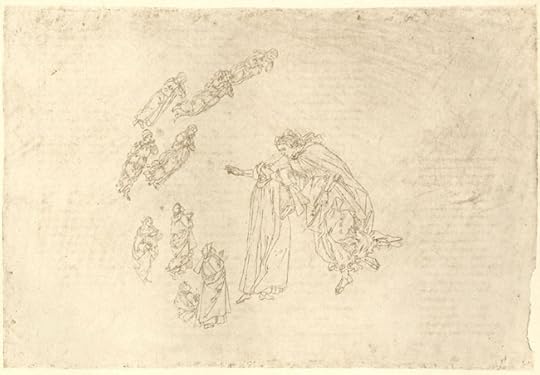
Sandro Botticelli: Paradiso Canto IV.1. “First Planetary Sphere (Heaven of the Moon); Beatrice Explains to Dante Where the Blessed Reside.” c.1480 - c.1495. Drawing.
 http://www.worldofdante.org/media/ima...
http://www.worldofdante.org/media/ima...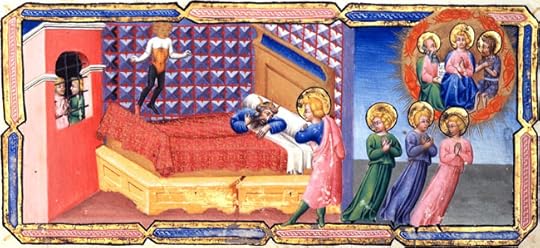
Giovanni di Paolo: Paradiso Canto 4.13. “Dream of Nebuchadnezzar.” c.1450. Manuscript illumination. Yates Thompson 36. British Library.
(Mislabeled 4.43 on The World of Dante site.)
Canto 4.10-18 (Hollander)(view spoiler)
Daniel II, NRSV (view spoiler)
 http://www.worldofdante.org/media/ima...
http://www.worldofdante.org/media/ima...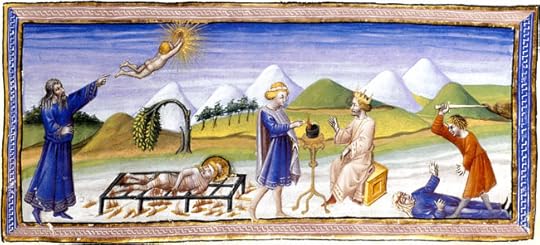
Giovanni di Paolo: Paradiso Canto 4.82. “Martyrdom of St. Lawrence.” c.1450. Manuscript illumination. Yates Thompson 36. British Library.
I presume that is Mucius Scaevola on the right, the classical figure, a young man of ancient Rome, who vowed to kill Porsenna and let his right hand be consumed by fire when its thrust missed the mark.
Paradiso Canto 4.70-90 (Hollander) (view spoiler)
Lily, I find that I very much like the colorfulness of di Paolo.
Laurele wrote: "
Tolstoy wrote..."
Nice, Laurele. I found the overview of Tolstoy's story on Wikipedia. Liked it.
http://en.wikipedia.org/wiki/The_Thre...
Tolstoy wrote..."
Nice, Laurele. I found the overview of Tolstoy's story on Wikipedia. Liked it.
http://en.wikipedia.org/wiki/The_Thre...
 Adelle wrote: "Lily, I find that I very much like the colorfulness of di Paolo."
Adelle wrote: "Lily, I find that I very much like the colorfulness of di Paolo."Oops, I lost a post. Let me see if I can quickly reconstruct before I need to get to a meeting. Yes, I too, love the work of the miniaturists with their deep, vivid colors. (I have two Book of Hours reproductions I cherish in my own library collection.) I am grateful the British Library makes so many of its precious collection of manuscripts available online. What a gift to the world!
Here is a link to some information on di Palo and the Yates Thompson Manuscript from "The World of Dante" page (note the suggested reading at the end):
http://www.worldofdante.org/gallery_y...
Regarding the swoon. For those who enjoy commentary, I like this. I don't believe it covers the swooning entirely---because Dante swooned crossing the river into the Inferno and I think he swooned or fell asleep and was lifted?? in Purgatory. Still, I found this interesting.
(view spoiler)
(view spoiler)
 Lily wrote: " Incidentally, this is Shrove Tuesday -- so it is head out for pancakes and ice cream sundaes, with Lent starting tomorrow."
Lily wrote: " Incidentally, this is Shrove Tuesday -- so it is head out for pancakes and ice cream sundaes, with Lent starting tomorrow."Can we suggest that members of this group give up all reading other than the Bible and the Divine Comedy for Lent? [g]
 Lily wrote: "As Beatrice wags her finger..."
Lily wrote: "As Beatrice wags her finger..."Hmmm. The first image that came to mind for me was the famous Raphael painting of Aristotle and Plato, Aristotle pointing down to earth and Plato (aka Beatrice?) pointing up to the Heavens.
 Roger wrote: "The answer to the first question seems to be this: The souls were forced to break their vows, but at some point their will ceased fighting and acquiesced. But remember that their eternal bliss is..."
Roger wrote: "The answer to the first question seems to be this: The souls were forced to break their vows, but at some point their will ceased fighting and acquiesced. But remember that their eternal bliss is..."But is anybody really forced to break their vows? What if Piccarda had just refused to leave the nunnery -- would they have entered the nunnery and removed her by force? Or would the nuns have rejected her? And what if she had just refused to take the wedding vow, but had declared before the priest brought in to marry her that there was indeed an insuperable impediment to her marriage in that she was already married to Christ?
How does one go about divorcing Christ, anyhow?
Given the example of the early martyrs who preferred death to renouncing their faith, didn't she actually have a choice? Not an easy one, I certainly agree, but at least a choice?
 Lily wrote: "Okay, who is "Timaeus"? (Line 49.) Okay, answer my own question, not "who" but "what" (one of Plato's dialogues)."
Lily wrote: "Okay, who is "Timaeus"? (Line 49.) Okay, answer my own question, not "who" but "what" (one of Plato's dialogues)."Actually, both a what and also a who. He was an Italian (it is believed, though some argue that Plato invented him, but I doubt that since so many of Plato's other protagonists are actual people) philosopher who was one of the participants in the dialogue that bears his name (and was also a participant in the Critias.
As an off-topic but perhaps interesting aside, it is in the Critias that Plato discusses Atlantis.
 Adelle wrote: "But the real shortcoming of Plato's doctrine is its denial of free will--if the soul is predestined to return to the same star as whence it sprung, then human choice on Earth becomes meaningless."
Adelle wrote: "But the real shortcoming of Plato's doctrine is its denial of free will--if the soul is predestined to return to the same star as whence it sprung, then human choice on Earth becomes meaningless."For Christians, yes, since Christians' souls are judged worthy or not worthy of Heaven based on their deeds and acts on earth.
But for Plato, it wasn't so; your deeds on earth had little to do with your place in the afterworld.
 Socrates seems to believe that deeds make a difference, if the Myth of Er in the Republic is to be believed. (I'm not sure that it is, or if it is, that this is Plato's belief as well.)
Socrates seems to believe that deeds make a difference, if the Myth of Er in the Republic is to be believed. (I'm not sure that it is, or if it is, that this is Plato's belief as well.)
Everyman wrote: "
But for Plato, it wasn't so; your deeds on earth had little to do with your place in the afterworld."
So...if Plato viewed one's deeds as having little to do with one's place in the afterworld...did Plato believe in pre-destination?
(I never read his description of souls returning to the stars they came from.)
Well, for what it's worth, from Timaeus: "Each soul was assigned a star (41d); if a person lived well, upon the death of the body the soul would return and dwell in his home star; if not, then the soul would be reincarnated (42a-c). " http://www.abu.nb.ca/courses/grphil/p...
Mmmm...and that seems to pertain to both sets of belief, yes? no?
It seems to say that a life well-lived is the life to live, ie, that one's actions in life can affect one's afterlife.
And yet, there also seems to be an aspect of pre-destination about it... no matter how good or worthy or well-lived one's life is, one returns only to the star from whence one began.
Are there other "better" "higher" stars?
And if there ARE "better" stars, does one have a better chance of ending up there if (1) one lives a less than good life on earth, and (2) is then reincarnated...
Is one reincarnated with source material from a different star?
Or from source material from the first star of origination??
Just mulling.
But for Plato, it wasn't so; your deeds on earth had little to do with your place in the afterworld."
So...if Plato viewed one's deeds as having little to do with one's place in the afterworld...did Plato believe in pre-destination?
(I never read his description of souls returning to the stars they came from.)
Well, for what it's worth, from Timaeus: "Each soul was assigned a star (41d); if a person lived well, upon the death of the body the soul would return and dwell in his home star; if not, then the soul would be reincarnated (42a-c). " http://www.abu.nb.ca/courses/grphil/p...
Mmmm...and that seems to pertain to both sets of belief, yes? no?
It seems to say that a life well-lived is the life to live, ie, that one's actions in life can affect one's afterlife.
And yet, there also seems to be an aspect of pre-destination about it... no matter how good or worthy or well-lived one's life is, one returns only to the star from whence one began.
Are there other "better" "higher" stars?
And if there ARE "better" stars, does one have a better chance of ending up there if (1) one lives a less than good life on earth, and (2) is then reincarnated...
Is one reincarnated with source material from a different star?
Or from source material from the first star of origination??
Just mulling.
 Everyman wrote: "Lily wrote: "As Beatrice wags her finger..."
Everyman wrote: "Lily wrote: "As Beatrice wags her finger..."Hmmm. The first image that came to mind for me was the famous Raphael painting of Aristotle and Plato, Aristotle pointing down to earth and Plato (aka..."
http://hum120.files.wordpress.com/201...
That one?
Detail:
http://www.webphoto.ro/italia/school-...#
(Note the commentary, other figures, location in the Vatican, ....)
Thx for calling to our attention, Eman.
 Adelle wrote: "...The doubts put me in mind of Doubting Thomas. Dante himself has undergone a pretty mircaculous journey...but but his desire is still for explanations ... he hasn't made the transformation of moving ahead on faith......"
Adelle wrote: "...The doubts put me in mind of Doubting Thomas. Dante himself has undergone a pretty mircaculous journey...but but his desire is still for explanations ... he hasn't made the transformation of moving ahead on faith......"Having been working on the images, I suspect that is good foreshadowing for our story, Adelle!
 Adelle wrote: "Explained online as "If God be the treasure of our souls, our hearts, i.e. our affections and desires will be placed on things above.
Adelle wrote: "Explained online as "If God be the treasure of our souls, our hearts, i.e. our affections and desires will be placed on things above.I can see Dante making this point...."
From Lenten study today of the Beatitudes:
Matthew 5:8
"Blessed are the pure in heart, for they will see God."
Discussed from the viewpoint that what you focus upon influences the parts of life you see and how you participate.
http://bible.oremus.org/?passage=Matt...
Lily wrote: "..."
From Lenten studies..."
Very nice, as the light of the souls in Paradise varied depending on what had influenced them...how they had acted on their values.
Thanks, Lily.
(liked the painting, too)
From Lenten studies..."
Very nice, as the light of the souls in Paradise varied depending on what had influenced them...how they had acted on their values.
Thanks, Lily.
(liked the painting, too)
 I read Canto IV for the Xth time this morning and found that the lines 64ff seemed like a commentary by Beatrice on some of the arguments about rape and violence that we have seen discussed around Hardy's Tess of the d'Urbervilles and the squabbles and babbling of certain politicians recently -- what is violence and what is giving in to violence:
I read Canto IV for the Xth time this morning and found that the lines 64ff seemed like a commentary by Beatrice on some of the arguments about rape and violence that we have seen discussed around Hardy's Tess of the d'Urbervilles and the squabbles and babbling of certain politicians recently -- what is violence and what is giving in to violence:(view spoiler)
The modern political, social, and moral questions have understandings to be applied to them that come out of medicine, psychology, and a whole bunch of other areas, but I found it interesting to find this passage suddenly seeming so contemporary in relevance.



THE STORY. The words of Piccarda have aroused in Dante two doubts: (1) if both she and Constance were forcibly prevented from fulfilling their vows, how can they be on that account less deserving of beatitude? (2) Piccarda spoke of the moon as her allotted sphere; was Plato then right after all in teaching that souls returned to the stars after death? Beatrice explains that all the souls of the blessed dwell only in the Empyrean, where all share “one sweet life, diversified”. They have appeared to Dante in the moon not because they reside there but in order that their less exalted state may thus be signified to him. His doubt concerning heavenly justice is removed when Beatrice distinguishes between what we wish to do and what, under pressure, we consent to do, for “our least acquiescence signs a pact with force.” Dante’s mind, now clarified as to his two doubts, conceives yet a third: can man by good works render satisfaction for unfulfilled vows? To this Beatrice gives her answer in Canto V.
THE IMAGES. The resolving of Dante’s dilemma and the allaying of his doubts: In the story, the discourses by Beatrice upon existence in Heaven and upon absolute and qualified will are occasioned by words uttered by Piccarda in the preceding Canto. Allegorically the freeing of Dante from the paralysis of his will, and the illuminating of his mind by revealed theology (Beatrice), represents a step forward in the soul’s progress towards God. The desire of the mind for knowledge and understanding is in itself a natural image of the desire of the soul to see God; in another sense the two desires may be seen to be identical, since the mind can be satisfied only by the ultimate Truth, which is God. Throughout Paradise, Dante’s advancement in understanding is a symbol and a measure of his progress towards his ultimate vision in the last canto.